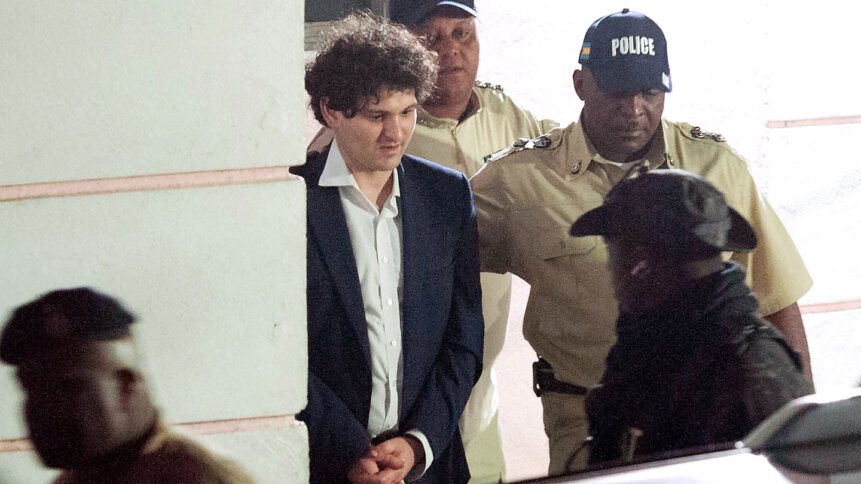FTX: Fraud or incompetence?

|
Getting your Trinity Audio player ready...
|
There have been, in the six years since 2016, an alarming number of points at which watching or reading your favorite news channel has made you wonder whether some of the biggest, most powerful people in the world were actively committing blatant fraud right in front of your eyes, or whether they were in fact just staggeringly incompetent and unqualified for the positions they held. The latest such moment – the fall and subsequent arrest of Sam Bankman-Fried, the so very former CEO of crypto-exchange FTX – at least has the saving grace that no-one realized he was either fraudulent or staggeringly incompetent until his empire had actually fallen.
“The next Warren Buffett.”
The fall of FTX may not need rehashing for many people. The second largest crypto-exchange in the world, it was run by Bankman-Fried with a billionaire swagger that saw him lauded as “the next Warren Buffett,” and won him fawning headlines about his “counterintuitive investment strategy.”
In fairness, Fortune magazine, which coined that phrase in August 2022 (all those seeming years ago), had the good grace to admit that the strategy would either build him an empire or end in disaster.
The magazine was always only ever going to be half right, but Bankman-Fried has worked hard to make it as right in one direction as it could possibly be.
Earlier in 2022, when the overall value of cryptocurrency took an arguably long-overdue spanking, Bankman-Fried was able to use FTX to bail out some smaller players like BlockFi.
Then, over the course of one fairly turbulent week in late November, the wheels didn’t so much come off the FTX wagon as spontaneously combust, roll into a gas station, blow it to bits, and leave investors, staff, and commentators around the world picking bits of incinerated cryptocoin out of their hair and asking “What the hell just happened?”
The answer is still to be precisely determined. Certainly, we know there were rumors of trouble with FTX, that resulted in more and more people pulling their funds from the exchange. We know Bankman-Fried, in a moment of sustained desperation, tried to find a bailout package of his own and failed. And we know that, while the exchange was in the process of imploding into Chapter 11 bankruptcy, it was hit by a mega-hack that removed some $600 million from the exchange’s assets at a moment many investors have found to be both significant and suspicious.
That sort of thing never happened to the old Warren Buffett.
The debate around intent.
But whether the collapse of FTX was down to the inherent instability of the relatively unregulated cryptomarket, whether it was intentional, cold-blooded fraud by Bankman-Fried, or whether he was simply too chronically incompetent to sustain his good fortune has yet to be definitively decided.
US law enforcement appears to have made up its mind – at least enough to arrest Bankman-Fried for what is now being described as “one of the biggest financial frauds in US history,” as company after company folds or feels the impact of the collapse of the FTX “house of cards.”
The arrest is expected to serve as notice to other financial houses, both traditional and cryptocurrency-based, that wildly irresponsible financial behavior will not be tolerated in the United States – at least, not once it’s been proven to result in abject failure.
Arrested and toxic.
Bankman-Fried was originally arrested in the Bahamas, where FTX was building its headquarters and its reputation. The reputation of the Bahamas itself as a haven for cryptocurrency transactions is probably now ruined for a generation by association with Bankman-Fried and FTX, which is said to have collapsed owing its 50 biggest creditors around $3.1 billion.
He was then transferred to the US, where the US Attorney’s Office for the Southern District of New York and the Commodity Futures Trading Commission (CFTC) announced parallel fraud charges against him. The case is complicated by additional charges of violating campaign finance laws. Bankman-Fried plowed tens of millions of dollars of what are now being described as “ill-gotten gains” into the campaigns of both Democrats and Republicans, allegedly in a bid to sway the direction of future Washington lawmaking.
Fraud or idiocy?
All of that seems to support the case of US law enforcement that Bankman-Fried is guilty of pre-meditated fraud (Bankman-Fraud?). But both Bankman-Fried himself, and FTX’s new CEO, John Ray, are strongly contending that the “next Warren Buffett” was not in fact knowingly fraudulent – merely incompetent.
“I didn’t knowingly commit fraud. I don’t think I committed fraud. I didn’t want any of this to happen. I was certainly not nearly as competent as I thought I was,” Bankman-Fried claimed to the UK’s BBC News early in December. Meanwhile, Ray told a US congressional committee that FTX had been run by a small group of “grossly inexperienced, non-sophisticated individuals.”
He added that on becoming CEO he had been faced with “an utter lack of record-keeping – no internal controls whatsoever.”
In the long run, whether Bankman-Fried was knowingly defrauding investors in FTX, or was simply too reckless to realize he was defrauding them, it’s unlikely to bring any comfort to those whose investment is now worth less than a wish on the wind – nor the other cryptocompanies that have sunk in the aftermath of the FTX collapse.
But whether the evidence of staggering business recklessness and incompetence is enough to get Bankman-Fried off the charges of deliberate fraud remains to be seen. Either way, it reflects poorly on the unregulated nature of the cryptomarket, and only invites further scrutiny of other players in the industry, from both governmental – and potentially law enforcement – authorities.










